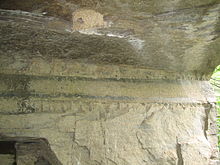
Summary
The Sitovo inscription is an inscription in Bulgaria that has yet to be satisfactorily translated.


Discovery edit
The inscription was discovered in 1928, on the wall of a rock shelter near the village of Sitovo, close to Plovdiv, Bulgaria. It was first documented by amateur archaeologist Alexander Peev. The inscription is in two lines which are 3.40 metres (11.2 ft) long. The written signs are 40 centimetres (16 in) tall. The inscription has been tentatively dated to between 300 and 100 BCE.[1]
In 1943, Peev was executed by firing squad on suspicion of sending a coded message to the Soviet Union. He had sent an example of the text to Soviet archaeologists, in the hope that they could decipher its meaning.[2][3] The inscription was published in 1950 by Z. R. Morfova.[4] Peev was posthumously awarded the Order of Lenin for his resistance efforts against the Bulgarian government.[2]
Possible translations edit
Amateurs and professionals have attempted to translate the inscription. It has been variously identified as local ancient language, Celtic, Slavic, and Phrygian.[1][5]
See also edit
References edit
- ^ a b Vassileva, Maya (1999) A Few Phrygian Onomastic Notes. Epigraphica Anatolica : Zeitschrift für Epigraphik und historische Geographie Anatoliens (31). pp. 175-180. ISSN 0174-6545
- ^ a b "Alexander Peev (1886-1943) and the Ancient Sitovo Script". thesanghakommune.org. 26 February 2017.
- ^ Moss, Candida (6 August 2017). "Inside the Deadly Pursuit of Unsolved Languages" – via www.thedailybeast.com.
- ^ Morfova, Z. R., "Nadpispri Sitovo, Plovdivsk aokolia", (Godishnik Nanarodnia Arheologiches Kimuzei, 1950
- ^ Mel Copeland. "Translation of the Phrygian language".
The second inscription is a rock-text near Sitovo village at 30 km south-east of Plovdiv in the Rhodopes Range. After their own autopsia Bayun-Orel 1991, 144-148, dated the inscription in III-I c. B.C. and saw on the rock "Ipta" as "figurine, cult object, image (in paredria?) with Bacchus' figurine."
[sic]
Further reading edit
- L.S. Bayun / V.E. Orel, "The Inscription from Sitovo", Orpheus, Journal of Indo-European and Thracian Studies 1, pp. 144-148, 1991


